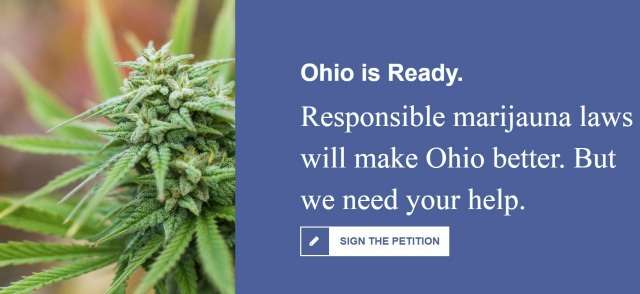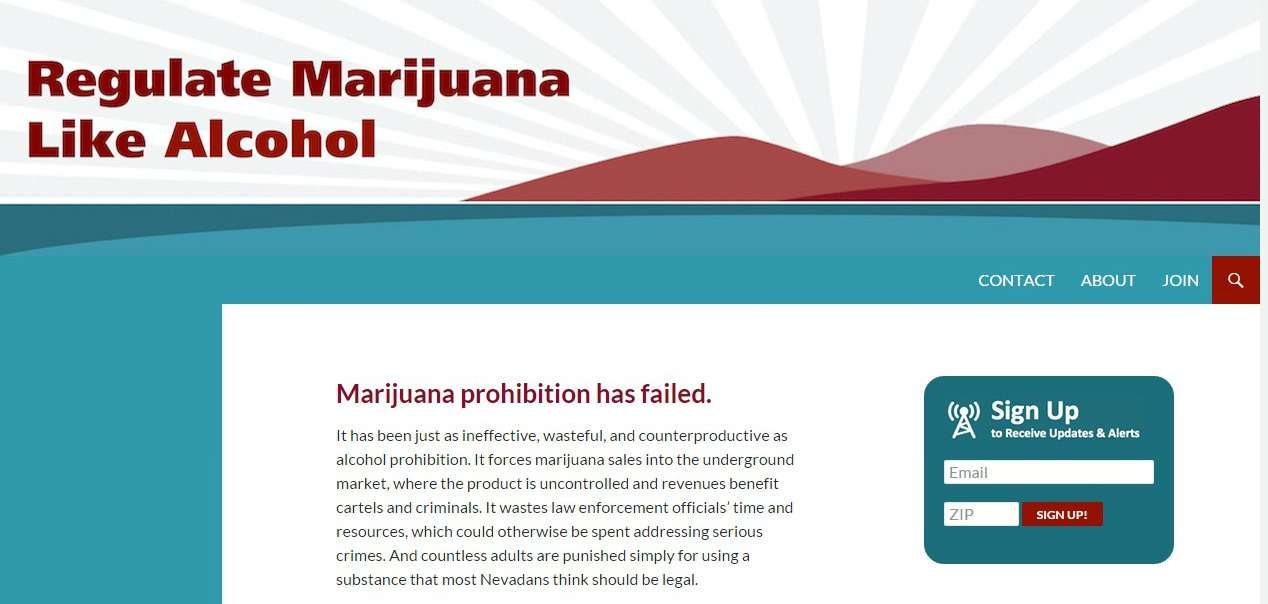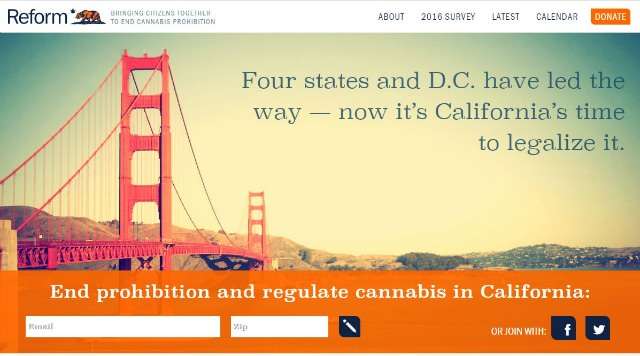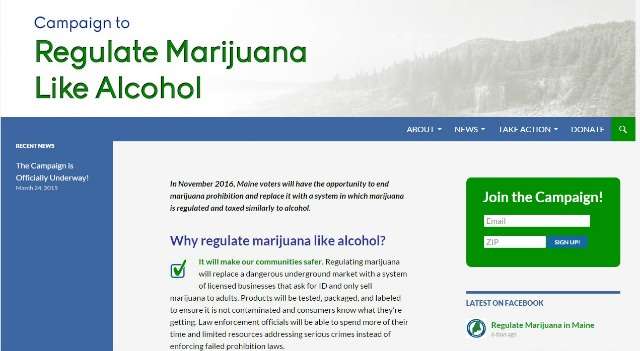Which States Will Legalize Pot Next?
A preview of ballot initiatives that voters are expected to face this year and next
At the beginning of 2014, when Colorado became the first state to allow the sale of marijuana for recreational use, the whole world was watching. "It was insane," says Toni Fox, owner of Denver's 3D Cannabis Center, where the first sale happened. "On January 1, there were close to 200 reporters here. Controlled chaos. It was just packed with reporters."
But the more successful Colorado's model is and the more imitation it inspires, the less attention it will get. "Colorado is not going to be the top dog for much longer," says Kayvan Khalatbari, co-owner of the Denver Relief dispensary. "I think it's only a matter of time before Colorado really gets overlooked."
Khalatbari predicts that "up to a dozen states" will have legal marijuana by the end of 2016, which may not be far from reality. Last year Alaska and Oregon joined Colorado and Washington, where voters also approved legalization in 2012, and similar ballot initiatives have a decent or better chance of succeeding in at least half a dozen states this year and next, while legislators are considering legalization in states such as Vermont and Rhode Island. These are the ballot initiatives to watch:
Ohio

The constitutional amendment sponsored by Responsible Ohio is the one legalization measure that is expected to be on the ballot this year rather than next. The Marijuana Legalization Amendment designates 10 sites owned or controlled by its financial supporters—who include Columbus real estate developer Rick Kirk, fashion designer Nanette Lepore, former NBA player Oscar Robinson, and former NFL player Frostee Rucker—as the only places where commercial production will be allowed, at least initially.
That marijuana minyan has been controversial. "How [does] creating a cartel benefit anyone besides the people who profit from it?" asked a member of the audience at a February forum sponsored by the Central Ohio chapter of the National Organization for the Reform of Marijuana Laws (NORML). The Cleveland Plain Dealer reported that "the room erupted in applause." Ohioans to End Prohibition, a competing group aiming for the 2016 ballot, calls for "a free market in legal marijuana." Under its measure, the group says, "any adult or corporation will be able to apply for and purchase commercial licenses to grow, manufacture, or sell marijuana and marijuana products."
In February, responding to criticism of its locked-down approach to cannabis cultivation, Responsible Ohio decided to include "regulated and limited home growing" in its initiative. The amended version of the measure allows adults 21 or older to grow up to four flowering plants and possess up to eight ounces at home for personal consumption, provided they obtain state-issued licenses. Home cultivation is allowed by every state that has legalized marijuana so far except for Washington. Like the other initiatives, Ohio's allows adults to possess an ounce or less of marijuana in public, but it prohibits consumption in "any public place," which it does not define.
Responsible Ohio spokeswoman Lydia Bolander says the initiative's limit on commercial producers is designed to facilitate regulation and ensure that "those individuals are ready and willing to start production as soon as possible." She adds that there will be many other opportunities for people to make money in the newly legal cannabis industry. The amendment, Bolander says, allows "one retail store per 10,000 residents statewide, which would give us about 1,100 retail stores that could be licensed throughout the state." (By comparison, Washington, with a population about 40 percent smaller than Ohio's, plans to license just 334 retailers.) Bolander adds that newcomers are welcome in edible manufacturing, pot testing, and "peripheral businesses in the supply chain."
Local governments also stand to benefit financially from marijuana legalization, since they will get 85 percent of the revenue from the taxes specified in the amendment: 15 percent of gross revenue received by growers and marijuana product manufacturers, plus 5 percent of gross revenue received by retailers. By contrast, the states that have legalized marijuana so far are taxing it based either on price or weight. "You can't play a game with what your gross revenue is," Bolander explains, "and that ensures that the tax revenue will be collected and it will go where it's supposed to go."
If voters approve the constitutional amendment, which in Ohio requires only a simple majority, it will be the first time a state without a medical marijuana law legalizes the drug for general use. Under current law, possessing even the tiniest amount of marijuana, no matter the reason, is a misdemeanor; as little as 100 grams (about 3.5 ounces) can lead to a jail sentence; and twice that amount is a felony. It's not clear whether Ohioans are ready to leap from that system to one in which not only consumption but production and distribution (provided they are authorized) do not trigger any punishment at all.
A Quinnipiac University poll conducted in March found that 52 percent of Ohio voters thought adults should be allowed to "possess small amounts of marijuana for personal use," which is not quite the same as legalizing commercial production and distribution. "Our internal polling has definitely shown that there's very strong support for full legalization," Bolander says, "and we're confident that that number's only going to continue to grow between now and November."
Rob Kampia, executive director of the Marijuana Policy Project (MPP), thinks it's risky to put a marijuana initiative on the ballot in a year when people are not electing a president, since turnout is lower then, especially among the younger voters who are most likely to favor legalization. He worries that a defeat in Ohio could be portrayed as a reversal of the movement's momentum. "That failure will be the only failure in the country," he says, "and then the media will feed on that: 'Oh, my God, legalization is backsliding.'"
Bolander says an off-year election in Ohio has advantages. "Ohio in a presidential year, the political noise is just cacophonous, and you really cannot have a conversation about another issue that isn't influenced by political dynamics that are outside of your control," she says. "Rather than trying to have that conversation in a year when we're also talking about a presidential race, a Senate race, and numerous other congressional and local races at the same time, this is going to give us a unique platform to be able to have a bigger conversation about why this is such an urgent necessity for Ohio."
Nevada

Nevada, where voters will decide whether to legalize marijuana next year, is the only state where an initiative already has qualified for the ballot. Like Colorado's Amendment 64, the Initiative to Regulate and Tax Marijuana would make it legal for adults 21 or older to possess up to an ounce, grow up to six plants at home, and transfer up to ounce at a time to other adults "without remuneration." The initiative charges the state Department of Taxation with licensing and regulating marijuana producers, distributors, and retailers. It imposes a 15 percent excise tax on the "fair market value" of marijuana sold by growers.
Consuming cannabis in a marijuana store, "a public place," or a moving vehicle would be a misdemeanor punishable by a fine of up to $600. The initiative defines "a public place" as "an area to which the public is invited or in which the public is permitted regardless of age," which suggests that, as in Alaska, age-restricted establishments (other than marijuana stores) could allow cannabis consumption on their premises. That option would distinguish Nevada from Colorado and Washington, where the rules governing consumption outside the home remain fuzzy.
Nevada, like all the other states that have legalized cannabis for recreational use, already has medical marijuana. As in Colorado, dispensary owners would have the option of switching to the new market.
Kampia, whose organization is backing the Nevada initiative, notes that legalization measures were supported by 39 percent of Nevada voters in 2002 and 44 percent in 2006. "Both of those were mid-term elections," he says, "so the numbers would automatically be lower than if we had done the presidential elections. That was something that I've learned not to do again. Presidential elections are just superior for marijuana." Last February an MPP-sponsored poll put support for legalization in Nevada at 54 percent.
"We consulted with most of the gaming moguls while we were drafting the Nevada initiative," Kampia says, and "they just said that if we abided by a few of their basic requests, like not allowing people to smoke pot on the Las Vegas Strip, then they probably wouldn't care that much about the initiative." One gaming mogul who might care: billionaire Sheldon Adelson, a major Republican donor who last year helped defeat Florida's medical marijuana initiative bygiving more than $5 million to the opposition. "Sheldon Aldelson lives in Nevada," says Kampia, "so he could write a check for a couple of a million dollars and make that campaign very difficult."
California

It may seem puzzling that California, which blazed the medical marijuana trail back in 1996, has not legalized recreational use yet. The state's last legalization initiative, Proposition 19, fell four points short of a majority in 2010, just two years before legalization won by 10 points in Colorado and 11 points in Washington. "Partly it was a case of premature ejaculation," says California NORML coordinator Dale Gieringer, who is working with ReformCA, a.k.a. the Coalition for Cannabis Policy Reform, to produce an initiative for the 2016 ballot that is also backed by MPP. "The 2010 initiative, which I was very much against writing in 2010, was just too soon, and it was an off-year election." He adds that "the language had not really been discussed and vetted adequately" and "there wasn't a broad coalition working on it."
ReformCA, which needs to finalize its initiative's language by July, hopes to avoid those pitfalls. "The most difficult question that we face at the moment is medical marijuana regulation," Gieringer says. "It's been sort of an ongoing scandal in California that the state has not really come up with any clear regulatory guidelines on medical marijuana." The legislature is trying again this year, he says, and "it's important" that whatever it produces, assuming it produces anything, be "compatible with our plans for the initiative." The problem is that legislators have until October to pass a bill and get it signed by the governor, meaning they may act after the initiative is finalized.
"We have to come up with something that is compatible with California's longstanding cannabis growing culture," Gieringer says. "Whatever we come up with is going to be devised in a way to accommodate as much as possible all of those growers, many of them outdoor growers who have been around for a long time, and give them an opportunity to participate."
Gieringer also would like the initiative to address the question of where, aside from private residences, people are allowed to consume cannabis. Kampia says voters might not go for that. While "people who support legalization prefer for there to be opportunities to use marijuana socially in public settings, such as bars or marijuana-specific coffee shops like Amsterdam's," he says, allowing consumption outside the home "also raises concerns that the opposition will say there's going to be more people smoking and driving."
Kampia also is not sure it makes sense to tackle medical marijuana. "The advantage to including the regulation of medical marijuana is that it would allow the existing medical marijuana people to find a more legal way of being involved with medical marijuana and not being in a gray area if they wanted to move out of the gray area," he says. "A disadvantage is that it complicates the campaign message, because then you're talking about two separate things in the same campaign."
A March survey by the Public Policy Institute of California found that 55 percent of the state's likely voters prefer taxing and regulating marijuana to banning it. That was the highest level of support for legalization found by the organization since it started asking the question in May 2010.
Although opponents of legalization initiatives typically have not managed to raise much money, Kampia thinks California might be different. "First of all, the opposition tasted victory in Florida," he says. "Also, California's the only state that's consistently had major opposition to its serious criminal justice reforms. The narcotics officers and the prison guards in California have real money, and they're willing to spend it."
Massachusetts
In 2008 Massachusetts voters approved marijuana decriminalization by a margin of nearly 2 to 1. Under that initiative, possession of up to an ounce became a civil offense punishable by a $100 fine. Four years later, a similarly large majority approved medical use of marijuana. Are Bay Staters ready to go all the way? MPP, which is backing a 2016 initiative that has not been written yet, thinks so.
"Decriminalization was more popular than almost every politician in the state," Kampia says. A Boston Herald poll conducted in late January and early February of 2014 found that 53 percent of likely voters favored legalization, while a Boston Globe poll last July put support at 48 percent. Kampia calls those results "stale," noting that more recent surveys have found that something like 52 percent of Americans think marijuana should be legalized. "The national number is 52 percent," he says, "so you know Massachusetts is going to be higher than 52 percent."
Maine

Maine decriminalized marijuana possession back in the 1970s. Under current law, as amended in 2009, possessing less than 2.5 ounces is a civil violation, punishable by a fine of $350 to $600 for up 1.25 ounces and $700 to $1,000 for more than that. A medical marijuana initiative passed in 1999 with 61 percent of the vote. In 2013 two-thirds of Portland voters backed an MPP-supported ballot initiative repealing all local (but not state) penalties for possessing up to 2.5 ounces. A similar initiative passed in South Portland last year.
"We looked at it as getting the voters and the media used to thinking and talking about marijuana in a very intense way," Kampia says. "We were just trying to get people used to thinking about marijuana so that when we go for the big one, it's not going to be considered alarming." In 2013 Public Policy Polling found that 48 percent of Maine voters supported legalization, while 39 percent were opposed and the rest were undecided. Mason Tvert, MPP's communications director, says he believes that is the most recent publicly available poll on the question.
The MPP-backed Campaign to Regulate Marijuana Like Alcohol submitted a Colorado-style legalization initiative to the Maine secretary of state on March 24, aiming for the 2016 ballot. Legalize Maine, a competing group that bridles at such out-of state meddling, submitted its initiative in February. The campaign says "Mainers don't need a group from Washington, D.C., to dictate what's best for them."
Arizona
In Arizona, where voters approved medical marijuana by a tiny margin (two-tenths of a point) in 2010, the MPP-backed Safer Arizona recently completed the latest draft of its initiative, which is similar to Colorado's. Kampia notes that Arizona currently has about 90 medical marijuana dispensaries and may eventually have as many as 126. "It all seems to be working well," he says. "The medical marijuana system that's currently operating is showing the people of Arizona that having some marijuana stores scattered around the state is really not causing any community problems."
A February poll by the Morrison Institute for Public Policy at Arizona State University found that 45 percent of Arizona adults want to "make all marijuana use legal for those 18 years of age and older." A 2014 poll limited to voters found that 51 percent supported legalization.
Which Will Win?

At this this point (which is still quite early in the process), legalization looks likely in California, Nevada, and maybe Maine, less so in Ohio, Arizona, and Massachusetts. "The polling in Ohio, while better than what some people might expect, is not as good as in [other] states," Kampia says, "so they're taking a risk. It's their money, so the only downside for us is that if they lose, which is not guaranteed, it might change the national narrative for one year."
Not surprisingly, Kampia is more bullish on the states where MPP has decided to put its money. "We're financially invested in the big five states in 2016," he says. "We wouldn't be spending money if we didn't think we could win five out of five. But in terms of whether I think we would consider it to be a victory or not, three out of five would be considered a victory, and four out of five is probably the most likely scenario."
That seems overly optimistic to me, but what do I know? I did not expect the Colorado and Washington initiatives to win in 2012, especially not by such healthy margins, and I did not expect voters to approve all three legalization initiatives on the 2014 ballot either. I look forward to being pleasantly surprised again.
This article orgininally appeared at Forbes.com.
Editor's Note: As of February 29, 2024, commenting privileges on reason.com posts are limited to Reason Plus subscribers. Past commenters are grandfathered in for a temporary period. Subscribe here to preserve your ability to comment. Your Reason Plus subscription also gives you an ad-free version of reason.com, along with full access to the digital edition and archives of Reason magazine. We request that comments be civil and on-topic. We do not moderate or assume any responsibility for comments, which are owned by the readers who post them. Comments do not represent the views of reason.com or Reason Foundation. We reserve the right to delete any comment and ban commenters for any reason at any time. Comments may only be edited within 5 minutes of posting. Report abuses.
Please to post comments


Voting against in OH. Freaking BS that just gives 10 people a cartel. Waiting for the 2016 version that is based on CO's that actually seems like a sensible idea.
I'll vote for it. I don't think it's going to pass though. I don't like the whole cartel thing nor do I like it with the casinos, but that can be fixed on the backend. I want to end the prohibition as soon as possible.
Yes, the most important thing is ending prohibition. Voting no because of the details is foolish.
I've made $64,000 so far this year working online and I'm a full time student. I'm using an online business opportunity I heard about and I've made such great money. It's really user friendly and I'm just so happy that I found out about it. Heres what I've been doing
http://www.work-mill.com
The public reaction in OH for the "cartel of growers" referendum has been surprisingly libertarian IMO. I have heard many people on media outlets disparage the stupidity of the proposed law while simultaneously supporting legalizing recreational use.
To be honest, I was surprised by this from my fellow Ohioans. They have a much more realistic and nuanced view than I expected (probably anecdotal but I am hopeful) with a lot less reefer madness hysteria than I expected . They want legalization but they don't want to do it stupidly by creating another cartel like we did with casinos. Perhaps this is due to the other group with competing legislation that is much more CO like.
That being said, it will be hard not to vote for anything that is less stupid than current laws or moves in in the proper direction. I just fear the difficulty in replacing bad laws that enshrine monopolies who will then have the resources to effectively fight any changes that effect their legally monopolized cash cow.
Catch 22 if there ever was one.
Hey Sullum, it's a shame you didn't make it to the Austin meetup. Next time...
I imagine Kentucky will be one of the last, down the list with Pennsylvania and Texas.
Bourbon makers hardest hit?
After law enforcement
I doubt they will be too much of a problem. It's more about the powerful poverty / ignorance vote in Kentucky. It seems like a majority of the poor smoke pot in Kentucky, but like it being illegal so they won't overindulge, or want it to stay illegal as a fire break against those other white trash that can't handle it. So the unemployed / drug use / arrest / unemployable loop goes on for another generation.
Shooting yourself and your kids in the foot is the state past time.
like it being illegal so they won't overindulge, or want it to stay illegal as a fire break against those other white trash that can't handle it.
Yee-haw!
The frogs begged Zeus for a king, and got what they asked for.
Don't forget the Baptist.
http://hemp.org/news/category/cannabis/kentucky
Texas currently has 2 seperate bills under consideration concerning pot.
One makes pot totally unregulated and the other makes posession a fine up to $100.
TX I imagine will surprise. It is actually taking a crack at criminal justice reform; decriminalization/legalization of marijuana is an essential element of such reform.
I would like to see states that legalize, allow small amounts or small number of plants grown for personal use, to be outside of any regulatory scheme, other than age restriction. Much like home brewing works now. I can brew up a batch that my friends and I can drink as long as I am not trying to make a business enterprise out of it.
It may not be an issue in Massachusetts. The legislature, which is largely against legalization, is nevertheless trying to push legislation to implement it in some fashion.
Why would they do such a bizarre thing? Because after we (Bay State voters) approved medical marijuana in 2012, not a single dispensary has opened yet due to all the red tape and cronyism, and we're PISSED. Maybe pissed enough to collectively say in 2016 "screw medical, DPH can't even handle that, the easy path is legalization".
If legalization does make it onto the ballot, it will include strong and unambiguous language that will give the legislature very little control over implementation. The pols here are running scared at the thought of having less power, and they can see the writing on the wall that some form of legalization is coming. So they're trying to pass something ASAP because they don't want to have to implement a ballot initiative, they'd rather write the law themselves. At this point, I don't know if that will be enough to convince the voters -- it sure as hell wouldn't convince me after the fiasco of the last two years.
I would bet on Maine being next. All of the other states I am doubtful of. Nevada might, but then again, these are the people who keep electing Harry Reid, so I'm not sure that they can get anything right.
CA will do it. The initiative in 2010, like the article said, was poorly thought out and promoted. Regardless, it still came close to winning in a midterm election.
If it does, the nut jobs in Sacramento will figure out a way to screw it up so much that it will be worse than when it was illegal. It's hard to think that anything good can be done in that state.
Eh, the but jobs haven't been able out how to regulate medical MJ statewide despite nearly 20 years to do so; it's pretty much up to the county or city with some voter passed guidelines. I personally think it'll be okay.
Google pay 97$ per hour my last pay check was $8500 working 1o hours a week online. My younger brother friend has been averaging 12k for months now and he works about 22 hours a week. I cant believe how easy it was once I tried it out.
This is wha- I do...... ?????? http://www.netjob80.com
Well, we've got an early start on Baptists and Bootleggers here in AZ.
The medpotters have split off and are trying to get a separate ballot initiative. The broader movement has the long knives out for them now.
On March 29, the national policy project's executive director, Rob Kampia, threatened in an email to ruin the dispensary business of Phoenix-area physician Gina Berman, who is leading the breakaway group.
"If you file a competing initiative with the Secretary of State anyway, we will specifically launch a series of actions to harm your business, in the spirit of what social-justice movements do to boycott bad companies or bad business owners," he wrote. "Everything we would do would be legal."
"For example, I'm already budgeting $10,000 (as of Friday) to pay people for 1,000 hours of time to distribute literature outside of your front door, and the literature will not portray you in a kind way. We will not target any other dispensaries; we will only target you."
http://tucson.com/news/local/c.....a542d.html
Attention 48 other states -- Please legalize recreational marijuana and take your homeless hippies back. Sincerely,
Denver
Wouldn't that be 49 other states?
I get paid over $87 per hour working from home with 2 kids at home. I never thought I'd be able to do it but my best friend earns over 10k a month doing this and she convinced me to try. The potential with this is endless. Heres what I've been doing,
----------- http://www.work-cash.com
It's good to see my fellow Penn State alumnus Rob Kampia making up for our other asshole alumnus, Harry Anslinger.
Hi, is it too early, in peoples' opinions, to begin lobbying for legalization of methamphetamine? Thank you.
Google pay 97$ per hour my last pay check was $8500 working 1o hours a week online. My younger brother friend has been averaging 12k for months now and he works about 22 hours a week. I cant believe how easy it was once I tried it out.
This is wha- I do..... ????? http://www.netjob80.com
I want to know what are the plans to take care of the drug warriors who have been on the front lines for the last 35 years? I still have 11 years until retirement. What are you going to do, just fire all of us? How many dollars have we brought into your communities through property confiscations? The more property we confiscate the less tax dollars YOU have to pay. You people just aren't using your heads. What are you going to do when half the country is too lazy to go to work? I'll tell you what you're going to do. You're going to call the drug warriors back to bail your asses out of this mess. And I hope we all tell you where to stick it!
I'm making $86 an hour working from home. I was shocked when my neighbour told me she was averaging $95 but I see how it works now.I feel so much freedom now that I'm my own boss.go to this site home tab for more detail.... http://www.navjob.com
we supply the best quality medical marijuana strains discrete overnight
Our strains are best grade AAA ++ We offer discrete shipping .
Here is a list of strains and more : Lavender oil, hemp oil, Hawaiian Snow, Blue Dream,
Chrystal, Hash, Hash oil Lavender, Grape Ape, Headband, Purple Kush, Snow White Feminized,
Diesel, Jack the Ripper, Silver Haze, B52, White Widow, Super Lemon Haze, Blue Cheese,
Lavender, OG Kush, Big Bud, New York Diesel Feminized, Grape Ape, Headband, Sour Diesel,
C-99, Chocolate Chunk, Whiteberry, Outdoor Blueberry, Northern Lights, California Outdoor
LA Confidential, Cheese, Afghan, Haze, Bubba Kush, LSD, Medusa Feminized, Super Skunk,
Trainwreck, Vanilla Kush, Juicy Fruit, Autoflower J. Horror Fem, Strawberry Cough,
Canyon, Sour Kush, Chiesel, Bubba Kush, Super Silver Haze, Apollo 13, Jack Herer ,
All inquiries are welcomed at.we also got some Hash Cannabis Oils.
you can call or text (803) 271-0876 or mail us at (morgananderson450@gmail.com)